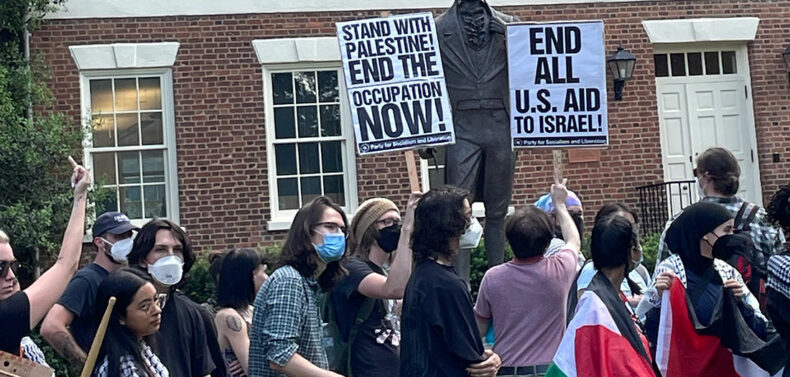A three-member panel ruled in favor of the University of Georgia and against six students who had appealed their suspensions for protesting Israel’s invasion of Gaza.
The “UGA 6″—Zeena Mohamed, Isabelle Philip, Ezra Lewis, Jack Hunter, Austin Kral and Lauren Heinze—were among nine students and 16 total individuals who were arrested in April after setting up a camp on the North Campus quad near President Jere Morehead’s office. After about an hour on the morning of Apr. 29, police moved in and dragged away protesters as they linked arms in a circle. The 16 people who were arrested at the Students for Justice in Palestine “liberation zone” were charged with trespassing, and at least some of them entered into pretrial diversion programs in June.
The nine arrested students were also placed under what the university called “interim suspension,” barring them from campus, including taking finals, living in dorms or participating in the May commencement ceremony. Three of them accepted their suspensions, while six appealed, and waived the Family Educational and Privacy Rights Act (FERPA) to make the July 29 hearing public.
The students used the hearing not only to contest UGA’s allegations that they violated the student code of conduct, but also to further air their views on the Israel-Hamas conflict. They said they were upset with Morehead for meeting with a Jewish student group, UGA Hillel, but refusing to engage in dialogue with Arab students and other Palestine sympathizers.
Philip said she supports the Palestinian cause because her family fled nearby Cyprus in 1974 during a civil war between Turkish and Greek forces. As her own graduation ceremony went on without her, “All I could think about were the thousands of students in Gaza who would not live to see their equally deserved graduation,” she said during her opening statement.
UGA accused the students of violating UGA policy by disrupting university activities, physical violence or intimidation, failure to comply with the orders of a university official, protesting outside of a free speech zone and attempting to enter a building.
The students argued that they never intended to occupy the Administration Building as UGA advocates alleged, that the protest was not disruptive, that they eventually filled out the proper paperwork for a protest, that they did not resist arrest, and that the university’s free-speech policy conflicts with state law. The Forum Act, passed in 2022, prohibits free-speech zones and designates all outdoor areas on public college campuses as public forums.
“As an educator, I see everything that’s happened since Apr. 29 as such a missed opportunity. Why not engage with students and model transparency and commitment to difficult conversations?” Sarah Gerwig, a Mercer University law professor, said in a news release from Students for Justice in Palestine. “Instead, administrators called the police, called for the use of force, and then saddled protestors with unreasonable sanctions. Universities should know better—we’ve seen this kind of intimidation tactic before—and not only does it not quell protected speech, it hurts the educational mission.”
The panel reached a decision Aug. 5, ruling that the students violated five clauses in the student code of conduct, including disrupting campus activities and failure to comply with orders from a university official. However, the panel ruled that the protesters did not endanger anyone’s health or safety, or attempt unauthorized entry into a building, as UGA had alleged.
Nevertheless, the UGA 6 now face a stiffer punishment than if they had not challenged their suspensions. The panel barred them from campus until Jan. 1, preventing them from living in student housing or taking classes during the fall semester, and forcing some to put plans for graduate school on hold again.
Josh Lingsch, a lawyer representing two of the students, called the proceedings a “kangaroo court.” The students vowed to continue fighting.
April was a time when similar or larger protests were rocking campuses across the country, and Georgia Republicans were eager to crack down. As demonstrations at UGA and Emory University unfolded, Gov. Brian Kemp called for “harsh penalties” for protesters who damage property or assault police. Meanwhile, many professors felt the students’ punishment was too harsh, with almost 200 signing a petition asking UGA to lift their suspensions.
UGA disciplinary hearings are student-run, with the accused students making statements and calling witnesses (in this case, with advice from pro bono attorneys) and two other students advocating on behalf of the university. One staff member served on the panel that rendered the decision, along with two students.
Like what you just read? Support Flagpole by making a donation today. Every dollar you give helps fund our ongoing mission to provide Athens with quality, independent journalism.










